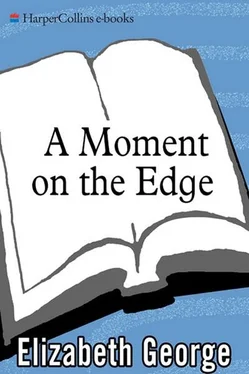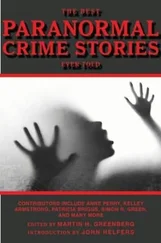“…looking at you as sober as a judge,” the journalist was saying.
“No such stuff, of course, but he used to work off that wheeze on poor boobs in railway carriages to see how they’d take it. Would you believe that one chap actually offered him—”
“Hullo!” interrupted his friend. “That bloke over there has fainted.
I thought he was looking a bit white.”
I Can Find My Way Out
NGAIO MARSH
Ngaio (pronounced ny’-o) Marsh (1895–1982) was born and lived most of her life in New Zealand, though she followed the anti-regional custom of the time in setting the majority of her detective novels in England, which she first visited in 1928. Through most of her more lucrative career as a novelist, she had a parallel existence in her first love, the theater, as actress, producer, director, designer, educator, and playwright. For thirty years, beginning in 1941, she spent part of each year directing and touring plays with the Student Drama Society of Canterbury University College in Christchurch, New Zealand. (Following theatrical tradition, Marsh’s official birth date for many years, 1899, shaved four years off her actual age.) Marsh’s first novel, A Man Lay Dead (1934), had a stage background as did several of its successors, including her final book, Light Thickens (1982). In a more subtle expression of her theatrical enthusiasm, most of her murders take place in the course of some sort of performance. Ironically, according to biographer Margaret Lewis writing in St. James Guide to Crime & Mystery Writers (fourth edition, 1996), Marsh was unable to duplicate the success of Agatha Christie in adapting her novels to the stage, because she “lost her sense of theatre and sought to preserve the general shape of the novels, with all the interviews, questions, and answers.”
Marsh was unusual at a time of gentleman amateur detectives in giving center stage to a policeman — but to be truthful, Roderick Alleyn of Scotland Yard had more in common in personal and professional style with Dorothy L. Sayers’s Lord Peter Wimsey and Margery Allingham’s Albert Campion than he did with a real law officer. Alleyn also had in common with Wimsey and Campion eventual marriage, in his case to Agatha Troy, a character who resembled Marsh herself and enjoyed the career of a successful painter Marsh had envisioned for herself early in her life.
Marsh had a remarkably consistent career as a writer of detective fiction. The puzzle was at the center of her work from the beginning, and she was a master of reader deception. If her writing and characterization became richer, the essential pattern of crime, investigation, and solution never changed. Remarkably, her last novels, published when she was in her mid-eighties, showed no perceptible decline in quality from their predecessors, in fact were among her best works, a statement that unfortunately can’t be made of such long-running writers as Agatha Christie and Erle Stanley Gardner.
One of the author’s rare short stories, “I Can Find My Way Out” is a Roderick Alleyn novel in miniature, appropriately featuring Marsh’s patented backstage setting.
At half-past six on the night in question, Anthony Gill, unable to eat, keep still, think, speak, or act coherently, walked from his rooms to the Jupiter Theatre. He knew that there would be nobody backstage, that there was nothing for him to do in the theater, that he ought to stay quietly in his rooms and presently dress, dine, and arrive at, say, a quarter to eight. But it was as if something shoved him into his clothes, thrust him into the street and compelled him to hurry through the West End to the Jupiter.
His mind was overlaid with a thin film of inertia. Odd lines from the play occurred to him, but without any particular significance.
He found himself busily reiterating a completely irrelevant sentence:
“She has a way of laughing that would make a man’s heart turn over.”
Piccadilly, Shaftesbury Avenue. “Here I go,” he thought, turning into Hawke Street, “towards my play. It’s one hour and twenty-nine minutes away. A step a second. It’s rushing towards me. Tony’s first play. Poor young Tony Gill. Never mind. Try again.”
The Jupiter. Neon lights: I CAN FIND MY WAY OUT— by Anthony Gill . And in the entrance the bills and photographs. Coralie Bourne with H. J. Bannington, Barry George and Canning Cumberland .
Canning Cumberland . The film across his mind split and there was the Thing itself and he would have to think about it. How bad would Canning Cumberland be if he came down drunk? Brilliantly bad, they said. He would bring out all the tricks. Clever actor stuff, scoring off everybody, making a fool of the dramatic balance. “In Mr. Canning Cumberland’s hands indifferent dialogue and unconvincing situations seemed almost real.” What can you do with a drunken actor?
He stood in the entrance feeling his heart pound and his insides deflate and sicken.
Because, of course, it was a bad play. He was at this moment and for the first time really convinced of it. It was terrible. Only one virtue in it and that was not his doing. It had been suggested to him by Coralie Bourne: “I don’t think the play you have sent me will do as it is but it has occurred to me—” It was a brilliant idea. He had re-written the play round it and almost immediately and quite innocently he had begun to think of it as his own although he had said shyly to Coralie Bourne: “You should appear as joint author.” She had quickly, over emphatically, refused. “It was nothing at all,” she said. “If you’re to become a dramatist you will learn to get ideas from everywhere. A single situation is nothing. Think of Shakespeare,” she added lightly. “Entire plots! Don’t be silly.” She had said later, and still with the same hurried, nervous air: “Don’t go talking to everyone about it. They will think there is more, instead of less, than meets the eye in my small suggestion. Please promise.”
He promised, thinking he’d made an error in taste when he suggested that Coralie Bourne, so famous an actress, should appear as joint author with an unknown youth. And how right she was, he thought, because, of course, it’s going to be a ghastly flop. She’ll be sorry she consented to play in it.
Standing in front of the theater he contemplated nightmare possibilities. What did audiences do when a first play flopped? Did they clap a little, enough to let the curtain rise and quickly fall again on a discomforted group of players? How scanty must the applause be for them to let him off his own appearance? And they were to go on to the Chelsea Arts Ball. A hideous prospect. Thinking he would give anything in the world if he could stop his play, he turned into the foyer. There were lights in the offices and he paused, irresolute, before a board of photographs. Among them, much smaller than the leading players, was Dendra Gay with the eyes looking straight into his. She had a way of laughing that would make a man’s heart turn over . “Well,” he thought, “so I’m in love with her.” He turned away from the photograph. A man came out of the office. “Mr. Gill? Telegrams for you.”
Anthony took them and as he went out he heard the man call after him: “Very good luck for tonight, sir.”
There were queues of people waiting in the side street for the early doors.
At six thirty Coralie Bourne dialed Canning Cumberland’s number and waited.
She heard his voice. “It’s me,” she said.
“O, God! darling, I’ve been thinking about you.” He spoke rapidly, too loudly. “Coral, I’ve been thinking about Ben. You oughtn’t to have given that situation to the boy.”
“We’ve been over it a dozen times, Cann. Why not give it to Tony?
Читать дальше












